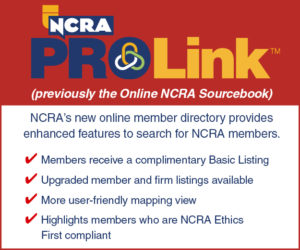Agata Baczyk, the owner and manager of Legal Interpreters, an interpreting agency based in North Palm Beach, Fla., explained how the court reporter and interpreter work together when they find themselves at a deposition together. This interview gives a sense of what happens from the interpreter’s point of view.
When a court reporter and foreign language interpreter both appear at a deposition, which person is responsible for what actions?
“I’m the interpreter. I’m the one who takes your words and brings them to life,” the singer Aaliyah once said. The interpreter does not only convey the words in his/her interpretation, but also the meaning behind it, the tone of voice, the hesitation, the happiness and sadness. The formal definition of the interpreter’s responsibility is to allow a Limited English Proficient individual to interact with others as if all parties spoke the same language, but there is so much more that comes into play during a successful interpretation encounter.
The court reporter’s job is more straightforward — at least that’s how it seems from the interpreter’s perspective — as the interpreter has to maneuver linguistic nuances, constantly switching between languages while effectively managing the flow of the conversation. While a court reporter’s job starts once the attorney wants the proceedings on the record, an interpreter may be used from the second he/she arrives. For example, an attorney may need the interpreter prior to the start of the deposition to have a brief conversation with the client. The interpreter’s job doesn’t stop whenever any parts of the deposition are “off the record.” Ideally, the interpreter would be almost invisible, lending voice to enable understanding, but ensuring as best as possible that the deposition proceeds seemingly as if the interpreter wasn’t present at all.
It is both the court reporters’ and interpreters’ job to ask for repetition of any unclear speech. However, the interpreter’s job extends to asking for clarifications, when necessary. Language can be ambiguous, interpretation between languages even more so. Interpreting words without understanding the meaning and intent behind them can lead to misunderstandings and misinterpretations. One time when I was interpreting I had an LEP tell me in Polish, “Mam protezę.” “Proteza” is one of those words in Polish that can either mean a prosthetic or denture. Without further context, it is reasonable that the LEP could have said, “I have a denture,” or “I have a prosthetic.” It’s just one out of many instances an interpreter would need to ask for clarification.
What kinds of certifications or recognitions should a foreign language interpreter have?
In general, the types of certifications and experience required would vary based on the interpretation setting. Ideally, interpreters hired for doctor’s visits and IMEs should hold a medical interpretation certification. Interpreters used for depositions and court appearances, as well as hearings, arbitrations and other legal settings, should be court certified (or court “registered” or “qualified,”, depending on specific state terminology). But it’s not as simple as it seems; even state court certifications may differ by state. The terminology, levels of certification, types of training, maintenance of certification requirements, etc., can vary. For example, in California a court certified interpreter would also automatically be medically certified due to specific state requirements and inclusion of medical vocabulary portions within the California state exam. Regardless of the specifics, the process usually involves passing some sort of state-approved exam.
Some rare language interpreters might not be able to become certified due to the lack of qualified graders in their language pair. In those instances they usually become “court approved” by taking an abbreviated version of the exam, usually a written exam only (in English), and additionally receive detailed evaluation of their experience and credentials. The full exam normally consists of the written portion and an oral portion that includes consecutive, simultaneous and sight translation to and from the foreign language that is being tested.
Who usually hires the foreign language interpreter?
Interpreters working in the legal settings are usually hired by a law office or court reporting agency in case of depositions and by the courthouse directly if the matter is heard in the court. Most of these clients are not very familiar with how to navigate the interpreting industry and don’t know what qualifications to look for in an interpreter. For that reason they reach out to interpreter scheduling agencies like mine. Many state courthouses have a Language Access Coordinator or Interpreting Services Unit that will undertake the daily task of reaching out to interpreters. Since most of them are freelancers, each request requires the scheduler to reach out to a number of interpreters in order to verify their availability. However, most courts can only hire directly those interpreters that are court certified, therefore if such is not available, they reach out to private agencies for help as well.
Is there a difference between a foreign language interpreter’s role in a deposition and in court?
Due to the nature of legal settings, interpreters must follow specific ethics and standards of practice to ensure their interpretation maintains the integrity of the proceedings. There are other settings where the interpreter’s role is more flexible. For example, in a medical setting the interpreter gains a limited ability to act as the patient’s advocate. However, an interpreter’s role remains the same regardless of whether they are in court or at a deposition, operating as a near-invisible voice facilitating communication between the parties.
The biggest difference between a deposition and a courtroom is the mode of interpretation. Depositions are generally interpreted in the consecutive mode, meaning that the interpreter articulates in the pauses between the questions and answers. In a courtroom, the LEP may or may not be actively involved in the exchange. The consecutive mode is used for the LEP’s witness testimony or when directly addressed by the court, since they follow a similar question/answer format as depositions. However, during all other proceedings the interpreter simultaneously whispers the interpretation to the LEP, keeping up with a normal speed of communication (or the typically higher than normal speed of court verbal exchanges). This mode requires the interpreter to listen and speak (interpret) with only a slight delay, allowing the LEP to understand the proceedings as they happen in real time. This mode also enables the court to function without any delays caused by interpretation.
But not all languages can be interpreted simultaneously. Each language has a unique grammatical structure, and some require the interpreter to hear the entire sentence before they can reformulate the sentence accurately into another language. German, for example, requires a much longer ear-voice span due to the verb position at the end of the sentence, which stretches the interpreter’s memory and makes simultaneous interpretation from German a very difficult, if not impossible, task. Being an agency owner, I am sometimes informed by other language interpreters that simultaneous interpretation is not possible in their language at all, such as in Burmese.
What can a court reporter do to help the foreign language interpreter?
As mentioned before, it is important to both the court reporter and interpreter that all speakers articulate clearly. The court reporter can help by asking for repetitions or spellings of terms that are unclear, mispronounced, or rushed. It takes the pressure off the interpreter and reduces the distractions that may affect the quality of the interpretation.
Also, whether in a courtroom or at a deposition, some judges and attorneys aren’t used to working with interpreters. A court reporter can assist by helping inform the parties of the rules and guidelines governing the interpreter’s conduct, as well as apprise them regarding standard practices. For example, an interpreter using their mobile or tablet to access a dictionary or other interpreting tools is a sign of an experienced interpreter who is aware of their linguistic limits. It is impossible to know every single word in one language, imagine being expected to do so in two (or more). As long as the interpreter properly informs the parties of a difficulty and of what he/she is about to do, they are not breaking the rules.
What can a court reporter expect from the foreign language interpreter?
Interpreters must follow professional standards and guidelines (which they are also usually tested on during various certification exams). An interpreter is the voice of the LEP and therefore will interpret entirely in the first person. If the LEP says, “I went to…” the interpreter will interpret by stating, “I went to…” as well. To distinguish between the interpreter’s own words, thoughts, and wishes from that of the LEP, the interpreter will always refer to themselves in the third person (For example: “The interpreter cannot hear the witness”; Not: “I cannot hear the witness.”). Interpreters will also tend to avoid ambiguous language when referring to themselves so instead of hearing, “Please repeat,” you should expect to hear, “The interpreter requires repetition.”
Court reporters should also expect the interpreters to spell foreign names of people and places. Often interpreters will automatically do so following the interpretation, but at times the court reporter will need to request it.
Can you offer any tips from the foreign language interpreter’s side to make things go more smoothly?
Often being bilingual is confused with being able to interpret professionally, or being able to evaluate interpretation. Interpreting requires extensive training and a rich linguistic background. Saying that anyone bilingual can interpret is like saying that anybody with hands can paint or sculpture. It is tempting for a bilingual individual or even someone with some knowledge of another language to focus more on the interpretation than what is being interpreted. Listening to both the interpreter and the speaker, especially during simultaneous mode, makes comprehension difficult, and the listener can miss out on vital information. That would apply not only to court reporters but to the witnesses and attorneys alike. Trust your interpreter, even if you are bilingual, since they are the only language expert in the room. I’ve had witnesses or attorneys, and occasionally even court reporters, question the interpretation provided. I’ve stood behind my reasoning 99 percent of the time. Certain linguistic nuances are very difficult to translate and sometimes the translation will not be literal or verbatim, as some attorneys like to describe it. It is important to understand that the goal of the interpretation is not to translate “word for word” but “meaning for meaning,” especially when dealing with language or culture specific expressions that do not translate literally.
People use idioms more frequently than we realize. These generally make no sense when interpreting literally, outside of their original cultures, so instead interpreters must convey the equivalency of meaning. For example, in my experience as a Polish interpreter I have encountered “Słoń nastąpił ci na ucho.” Its literal interpretation is “An elephant stomped on your ear.” What it actually means is, “You have no ear for music.” Other languages, like Spanish, are no different. A Spanish interpreter once told me that she uses “Como el burro que tocó la flauta.” The literal meaning is “As the donkey played the flute.” But here the equivalency of meaning would be “By pure luck.”
In the end, an interpreter and court reporter’s goals are similar. They are both on the sidelines of legal proceedings but integral to their function, and they both depend on clarity of speech to accomplish their jobs accurately. To ensure that things go smoothly both must support each other in reaching for that goal.
Agata Baczyk is the owner and manager of Legal Interpreters in North Palm Beach, Fla. She can be reached at info@legal-interpreters.com or 561-855-4660.










